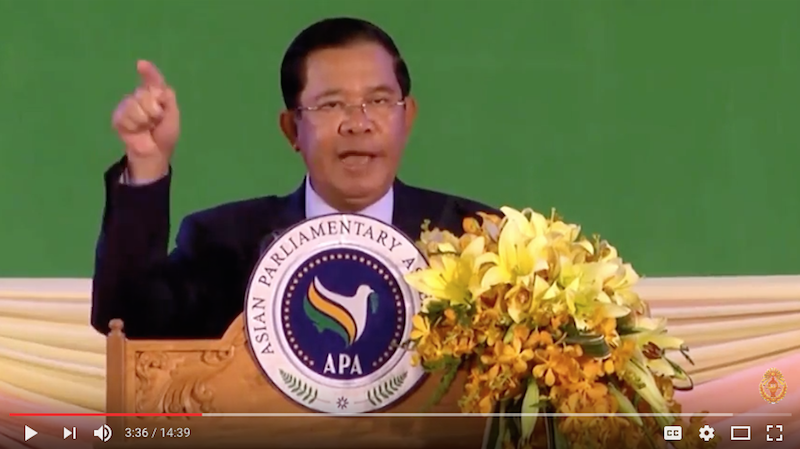Amid a crusade by the Cambodian government to keep foreigners out of its sovereign affairs, it released a video on Sunday titled “Samdech Hun Sen deals a strong blow to the United States of America and European countries surrounding the color revolution and the Middle East wars.”
The release of the video on YouTube, produced by the Council of Ministers’ public affairs office and excerpting a speech the prime minister delivered to Asian parliamentarians during a conference last week, also coincided with the start of events to mark Human Rights Day.

In his speech, which is subtitled in English and interlaced with footage of destruction in war-torn Middle Eastern countries and refugees fleeing to Europe, Mr. Hun Sen blames the situation on the U.S. and Europe and what he describes as their insincere efforts to promote democracy and human rights.
“The places where wars have broken out and become war zones, the overthrow of military forces and the overthrow from the so-called color revolutions are suffering severe catastrophes under the influence of democracy and human rights,” Mr. Hun Sen says.
“Is color revolution preferable or disgusting? And should the International Criminal Court sentence the masterminds who have made the Iraqi people and those in Middle Eastern nations suffer, send them to trial, or shall they be awarded medals and the Nobel Peace Prize?” he asks.
Mr. Hun Sen continues on to explain that Cambodia was also the victim of foreign powers hating an individual—then-Prince Norodom Sihanouk—and taking it out on an entire country, with images of U.S. warplanes dropping bombs on Cambodia.
“We know the taste of wars. We need to protect peace, and we are neither extremely nationalist or narrow-minded, caring only about ourselves,” he says.
“I hereby call on European countries to accept those refugees and provide them with suitable accommodation and jobs because this is the accountability of you all who support the policy of the United States over the issue of the color revolution.”
Mr. Hun Sen’s “strong blow” to the U.S. and E.U., along with his policy recommendations, come as the government is threatening to kick out the U.N.’s human rights office for interfering in its sovereignty by issuing public criticism of ruling party decisions.
Council of Ministers spokesman Phay Siphan said Mr. Hun Sen had the right to offer criticism of foreign countries as the elected prime minister of Cambodia, and such policies by the West were a threat to countries the world over.
“We don’t have a color revolution—a number of attempts have failed,” he said. “They use freedom and democracy, they use human rights as a weapon to make disorder, nothing else.”
The government has described the opposition CNRP’s mass demonstrations after the 2013 election as an attempted color revolution—a term it seems to conflate with civil war and military coups—and given the same label to a “Black Monday” campaign aimed at securing the release of human rights activists.
The government recently has said that it would not allow NGOs to march on Human Rights Day on Saturday. The groups have pledged to press ahead regardless, and some activists began their campaigns on Sunday, with about 250 people marching in Kompong Chhnang province, according to rights group Licadho.
During a panel discussion on human rights in Phnom Penh on Saturday, Maina Kiai, the U.N.’s special expert on freedom of assembly and association, said that the government appeared misguided in its belief that those rights were a sovereign matter.
“We as a world decided there are some things a government must do,” he said of the human rights declarations signed by Cambodia.
“When they say human rights is an internal issue, we say no,” he added. “When a state stops you from protesting peacefully, that is not an internal issue. That is an international issue.”
Mr. Kiai added that government efforts to suppress protests were often counterproductive, and that listening to public grievances was much more likely to end in a peaceful solution.
“That anger is what you don’t want to build up. You want to express it and deal with that,” he said. “It might be painful, but that is what being a government is about. As they say, if you can’t stand the heat, get out of the kitchen.”



